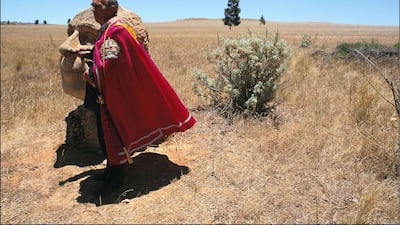The coronavirus pandemic has hastened the downfall of one of Australia’s weirdest tourist attractions – the country’s micronations, which have their own royalty, currency, flags and passports.
Australia’s oldest micronation, the Principality of Hutt River, formed in 1970, is set to be dissolved as its “prince”, Graeme Casley, sells its land in Western Australia to pay a Dh7.9 million tax bill.
Claiming independence from Australia, more than a dozen such micronations have been set up in recent decades by self-appointed "princes" and "emperors". These rogue leaders have variously formed armies, declared war on Australia, established foreign offices and naturalised hundreds of citizens.
Most of these nations are tiny, such as the Principality of Wy in Sydney, which is confined to a single home. The Principality of Hutt River, by contrast, is enormous, larger in size than Macau. It eventually surrendered to Australia last week, partly because of the pandemic, which has reduced its income from farming and tourism.
The principality shut its borders to tourists on January 31, the same day Australia announced a ban on entry into the country to all foreign nationals travelling from China. Until then, tourists were warmly welcomed to Hutt River.
Here are three of Australia’s most interesting micronations.
The Principality of Hutt River
In 2004, when I first learnt of the Principality of Hutt River, I thought it was a hoax. I was a cautious first-year journalist fearful of being tricked into writing about a fantasy. Later that day, I found myself on the phone with its head of state, Prince Leonard Casley, as I interviewed him about the legal ambiguity that he claimed gave him independence from Australia.
Of course, micronations such as this are not really independent, unlike Vatican City, which has legal sovereignty. Prince Leonard, who died early last year, claimed to have seceded from Australia in 1970, creating a micronation on his sprawling property 500 kilometres north of Perth. A wheat farmer, he made this move partly in protest against what he saw as unfair federal wheat-production quotas.
What began as an act of rebellion turned into a lifestyle and, now, a legacy for this quirky Australian. Prince Leonard's bold move quickly earned him national and international news appearances. His fame grew due to bizarre incidents, like in 1977, when he declared war on Australia after becoming angered by the Australian Taxation Office's pursuit of the principality's unpaid levies.
In 1988, he even formed a defence force, with an army and navy trained to defend the Hutt River. This was intended to increase the legitimacy of the principality, along with the presence of its own government and overseas bureaus in 10 countries.
While tax debts remained an issue for this micronation, Prince Leonard otherwise avoided controversy after that brief declaration of war. Supported by his wife, Princess Shirley Casley, and seven children, he grew the principality from a farm into an offbeat tourist attraction that drew visitors from around the world.
Tourists paid the equivalent of Dh10 for entry visas and were often shown around the principality by members of the Casley royal family. Guests could visit its museum, teahouse, chapel and post office, spending the Hutt River dollars that they received in exchange for Australian currency.
Many bought souvenirs such as Hutt River passports, postal stamps and driver's licences. Those items are even more special now that the coronavirus pandemic has contributed to the demise of this wonderfully bizarre micronation.
The Principality of Wy
Wy? Why indeed. At first glance it is hard to fathom what would convince someone to turn their suburban home into a micronation such as the Principality of Wy, the frontiers of which extend only as far as the boundaries of a single Sydney property. It was again anger that fuelled this claimed secession, carried out by the Prince of Wy, Paul Delprat.
Although he invented his princely alter-ego in 1960, Delprat did not create his micronation until 2004, in response to a dispute with Sydney's Mosman Council, a local government body in the salubrious suburb of the same name. When the council repeatedly denied his application to add a new driveway to his home, he started the principality.
Since then, Prince Delprat, 78, has taken to occasionally wearing a royal crown and gown. He is a well-known painter, whose work is displayed in the National Gallery of Australia. While the Principality of Wy does not grant tourist visas, Prince Delprat has been known to accept curious visitors into his home, which is adorned with royal regalia. However, like Hutt River, the Principality of Wy has closed its borders to all visitors amid the pandemic.
The Empire of Atlantium
The Empire of Atlantium makes Hutt River and Wy seem normal, by comparison. This self-declared independent state, which has land holdings in the Lachlan Valley, about 300km south-west of Sydney, rejects the term micronation. Its ruler, Emperor George II, argues on Atlantium's website that his empire is instead a "self-declared, primarily non-territorial sovereign entity and proto-world state that asserts immanent, parallel global sovereignty".
That sounds exactly like a micronation, but perhaps it's best not to disagree with an emperor. This man, George Francis Cruickshank, created Atlantium in 1981 along with two fellow Sydney residents "in response to a perceived rise in unwelcome political influences".
Almost four decades later, Atlantium claims to have a constitution, legislation, a judicial system, flags, a currency and diplomatic representation, as well as a population of about 1,200 citizens living in more than 100 countries. Atlantium uses Latin as its official language, is a secular state and employs a decimal calendar, as opposed to the common Gregorian version.
Tourists can arrange to visit Atlantium by contacting the office of Emperor George II. Just remember that, as he says rather sternly on his website, "there is nothing funny about Atlantium".

